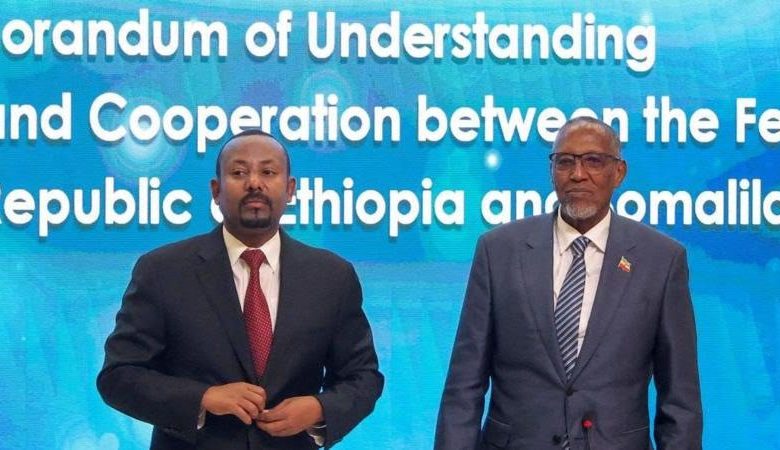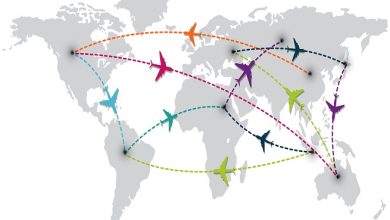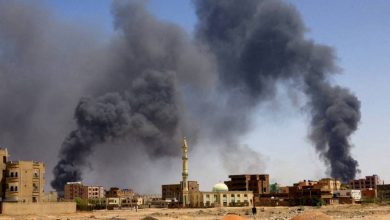Ethiopia’s Quest For Sea Access Inflames the Region

Sudan Events – Agencies
Introduction
This article intends to analyze Ethiopia’s pursuit of sea access as a political and hegemonic strategy in the Horn of Africa. It also aims to examine the impact of this strategy on the state-building process of Somalia while reviewing the recent memorandum of understanding (MOU) between Ethiopia and the breakaway region of Somalia known as “Somaliland.” It will also scrutinize the intersection of the geopolitical aspects of the Horn of Africa and trade disruptions in the Gulf of Aden and the Red Sea caused by the Houthi attacks. Further, the article will assess the harmful impact of proxy-seeking Arabian Gulf states on the Horn of Africa. Finally, it will provide recommendations for Somalia to avoid vulnerability to the negative impacts of competing foreign interests.
Ethiopia’s Strategy in the Horn of Africa
On January 1, 2024, Ethiopia signed a maritime memorandum of understanding (MOU) with the breakaway region of Somalia (“Somaliland”). The MOU, if implemented, will grant Ethiopia naval and commercial access to ports along Somalia’s Northwester coast in the Gulf of Aden, closer to the Red Sea corridor. In return, Somaliland would receive a stake in state-owned Ethiopian Airlines. (1) Ethiopia indicated that the MOU is for commercial and military purposes; however, Muse Bihi Abdi, the breakaway region’s president, announced it as a prelude to diplomatic recognition by Ethiopia. The diplomatic furor that erupted after the signing of the MOU had far-reaching implications for the Horn of Africa, as Ethiopia violated international law that codifies the sanctity of Somalia’s unity, territorial integrity, and independence. On February 17, 2023, at the African Union (AU) summit, Somali President Hassan Sheikh Mohamud, accused Ethiopia of trying to annex a part of Somalia’s territory by signing a sea access deal with Somaliland. Speaking at the AU summit in Ethiopia’s capital, Addis Ababa, Mohamud also said Ethiopian security forces tried to block his access to the summit amid a dispute between the two countries.
While the recent diplomatic incident could have been avoided, it appears to fit two agendas which fiercely drive Ethiopia’s political strategies in the Horn of Africa, and the recent MOU goes well beyond mere strategic considerations of a port and a naval base. These two strategies include (a) keeping Eritrea weak and isolated and (b) maintaining the status quo in post-civil war Somalia of a weak, decentralized client state to prevent the emergence of a strong government in Somalia that could potentially threaten its interests
History is replete with abundant evidence that Ethiopia was against Somali independence. On May 13, 1960, Ethiopia made its disapproval of the union of Somali territories known to the British government. It even tried to convince the Soviet Union to use its veto power to block Somalia’s admission into the United Nations (UN). (2) In 1948, as Somalia was being placed under UN Trusteeship, Ethiopia fervently sent numerous memos to the UN claiming Somalia and Eritrea was part of greater Ethiopia. (3)
Ethiopia has been keeping a watchful eye on Somalia’s recent strides towards progress. Somalia’s debt forgiveness under the Highly Indebted Poor Countries (HIPC) Initiative, (4) lifting of the arms embargo by the UN Security Council (UNSC) on December 1, 2023, (5) and accession to the East African Community (EAC) were perceived by Ethiopia as a threat to its sense of hegemonic power. (6) The perception of a threat from Ethiopia has been driven by its historical influence in the region and its desire to maintain a dominant position in the Horn of Africa. This opportunity arose due to the collapse of the state in Somalia in 1991 and Ethiopia’s efforts to be seen as a stabilizing force in Northeast Africa by Western powers.
3. Attacks on Global Trade in the Gulf of Aden and Red Sea: Impact on the Horn of Africa
The confluence of the recent events in the Gulf of Aden and the Red Sea, where Houthis are disrupting $4.8 trillion (15% of global trade) of world trade, is bringing sharp focus and importance to the geostrategic location of the Horn. Major container liners, controlling 61% of global shipping, are avoiding the Bab Al-Mandeb Strait due to security risks and they are now taking longer routes around Africa (Cape of Good Hope), adding up to 14 days and increasing costs. (7) While ships from Asia can avoid the Red Sea corridor, most Arabian Gulf economies are deeply dependent on maritime energy trade—hydrocarbon exports are responsible for 40% of Saudi and Qatari gross domestic product (GDP), and 50 % of Kuwait’s GDP.” (8) This trade route mainly goes through this area, and the Gulf nations want to safeguard this chokepoint. If the Bab Al-Mandeb Strait is blocked, it will prevent tankers in the Persian Gulf from reaching the Suez Canal and the Suez-Mediterranean (SUMED) Pipeline. This would force them to take a longer route around the southern tip of Africa. (9)
The Houthis’ trade disruption in this corridor is expected to increase the geostrategic importance of Somalia’s long coastline. Somalia will continue to be the center of attention for Arabian Gulf and Western countries as the former act as conduits for the latter’s interests. However, due to Somalia’s profound and prolonged crisis of state fragility and intransigence among Somali leaders over power-sharing to unite the country and adequately take advantage of Somalia’s geostrategic location, Western powers, and Arabian Gulf countries are likely to abandon previous strategies of one-size-fits-all for Somalia being a fragile state commanding the attention as potential safe havens for transnational terrorist groups and instead focus on safeguarding their interests in the Red Sea and the Gulf of Aden. (10)
4. The Search for a Regional Hegemon in the Horn of Africa to Counter Houthi Attacks
It is essential to understand that the Western countries and Arabian Gulf states consider the Horn of Africa as a critical unit of analysis in international politics and that the region’s security and economic interests are interconnected. Therefore, countries whose security and economic interests are threatened view the Horn of Africa as this one unit and are looking for a dominant hegemonic state with the necessary demographic size, economic capacity, military prowess, and political ambition to control the region. (11)
Which country in the Horn of Africa could serve as a strong defense against Houthi attacks that the Western and Arabian Gulf states see as a hegemonic state in the Horn of Africa? Western and Arabian Gulf countries erroneously view Ethiopia as a hegemonic power possessing the above factors, and building a navy with Western technology and Gulf financial support could serve as a defense against the Houthi threat in the Gulf of Aden. In this process, they pay lip service to Somalia’s sovereignty and territorial integrity if their interests are protected.
partners, even flawed ones like Ethiopia, which has a host of domestic challenges. In Ethiopia, several domestic problems impede its hegemonic ambitions. According to OCHA reports, over 20 million people are currently food insecure. Additionally, there have been 400 deaths related to famine in Tigray, and signs of famine are visible in many districts. There is an ongoing war in the Oromia region, while the Amhara region is facing the twin challenges of lack of fertilizers, resulting in no farming and a new widespread atrocity committed by the government. (12) Due to macroeconomic pressures aggravated by COVID-19 and the war, Ethiopia defaulted on its Eurobond in late December 2023, owing to foreign exchange shortages, balance of payments pressures, and external debt pressures. (13) These domestic issues and strained relationships with neighboring countries undermine Ethiopia’s position as the dominant power in the Horn of Africa region.
5. Ethiopia and Arabian Gulf States Proxy Strategy in the Horn of Africa
The UAE’s and other Arabian Gulf strategies in the Horn of Africa are multifaceted, but “the virtual proxy war which Ethiopia and the Arab states have played out in Somalia has been especially damaging (Menkhaus).” The UAE and other Gulf states consider the Horn of Africa as a strategic location and view the region through the prism of the Houthis, who in early 2015 seized the Yemeni capital of Sanaa, and Iranian support as an existential threat due to economic, political, and military strategies.
The loss of the Djibouti port by the UAE resulted from a contractual dispute between the Djibouti government and DP World. The disagreement arose from the latter’s attempt to force a renegotiation of its 30-year port contract in late 2015. As a result of the stalemate, the UAE had to relinquish control of the Djibouti port. The loss convinced the UAE to diversify its strategic portfolio of ports for economic and security purposes, and in May 2016, DP World signed an agreement to develop and manage Berbera Port for 30 years. The agreement terms stated that Ethiopia could exercise a 19% stake in the concession project, together with the Somaliland government (30%) and DP World (51%). However, by mid-2022, Ethiopia had yet to take up its stake, and DP World and Somaliland absorbed it. (14)
Furthermore, Ethiopia and the UAE have shared strategic interests in the Horn of Africa. As mentioned earlier, Ethiopia wants to isolate Eritrea and maintain the status quo in Somalia, which aligns with the UAE’s desire to have a hegemonic proxy in the region. This is exemplified by the UAE’s decision to abandon the Assab Port in Eritrea and forgo Djibouti port to instead invest in the port of Berbera, thus fulfilling Ethiopia’s aim to prevent investment in Eritrea and maintain the balkanization of Somalia. Additionally, Ethiopia’s strategy of a weak, decentralized client state in Somalia is illustrated by the recently signed MOU with the breakaway region of Somalia (Somaliland) and the diplomatic humiliation of the Somali president in Addis Ababa as he was attending the AU summit.
Somalia’s Political Fragmentation
a) Diplomatic Inconsistencies
Although the Gulf states’ proxy strategy in the Horn of Africa harms Somalia, the country had the potential to use its strategic position to prevent these damaging foreign policies from other Gulf countries; however, the Somali government has proven to be challenging to work with. This challenge was highlighted by the FGS’s defense pact with Ethiopia in 2014, which allowed the deployment of Ethiopian troops outside the African Union Mission in Somalia (AMISOM) mandate. Another example is the recent defense pact agreement signed in December 2023, which has yet to be shared with the public or the Somali Parliament and is presumed to include maritime security. This agreement is an illustration of strategic shortsightedness and diplomatic inconsistency on Somalia’s part. (15)
Despite the two countries’ opposing interests in Somalia, Somalia maintains security ties with Qatar and UAE. (16) In violation of Somalia’s sovereignty, the UAE entered into agreements with the government of Somaliland to construct a naval base and operate Berbera Port through DP World without the FGS’s consent; however, in May 2022, Somalia signed a controversial security agreement with the UAE. This is an example of the disjointed diplomatic inconsistencies engaged by the FGS, which should adopt a holistic approach to the country’s diplomatic relationships to maintain Somalia’s sovereignty.
Somalia’s Fractured Political Systems
Somalia’s fractured political systems easily facilitate foreign countries, such as Ethiopia and Arabian Gulf countries’ proxy strategy of keeping Somalia fractured and emboldening the breakaway region of Somaliland to sign the MOU with Ethiopia. The lack of a united and robust Somalia state against a background of constant push for recognition for independence by the Somaliland and the fissures of Federal Member States (FMS) of Somalia have created a vast internal political power vacuum and an appetite for internal interference by strong external actors that are threatening Somalia’s territorial integrity. It is imperative to address the ongoing issues in Somalia from multiple angles.
First, it is crucial to take immediate action against Somaliland’s secessionist ambitions and pursue all diplomatic channels against Ethiopia’s actions that have fueled the tensions in the region. The announcement of the Defense and Economic Agreement with Turkey on February 21, 2024, is a commendable strategy by the FGS.
Second, to unite the country and reduce the ambitions of secession of northern regions and further dismemberment of Somalia, the FGS should speed up the process of accepting SSC-Khatumo State as a fully-fledged FMS and new tentative Federal Member States (FMS) road map for Awdal.
Third, despite Somaliland celebrating the MOU in Hargeisa, it has no strong claim over the northern regions, which it erroneously claimed to exist previously. It has lost control of a significant portion of the eastern territory to pro-unionist forces, SSC-Khatumo, and internal unrest has been brewing due to delayed Presidential elections since 2022. (17) Therefore, the misplaced de facto claim is no longer present and “resolving the political status of both Somaliland and the newly established SSC-Khatumo should be a top priority in achieving long-term stability in the Horn” (Norman, 2024, p.2).
Fourth, Somalia must fill the Foreign and Security Ministries vacancies with qualified and capable individuals to navigate the country’s complex security and geopolitical challenges. The new ministers must demonstrate a deep understanding of regional dynamics, effectively engage with international partners, and have a strategic vision for enhancing national security and combating Al-Shabab. (18)
Fifth, the Defense Pact signed between FGS and Ethiopia must be annulled immediately, and the Somali Parliament should assert its authority by closely examining the contents of the Pact and holding the Executive Branch accountable.
Sixth, the FGS’s inability to anticipate the machinations of Ethiopia and the perpetual political bickering has left Somalia vulnerable to outside interference. It is necessary to find a way to break this cycle of political instability and mistrust among the different political leaders in Somalia.
Finally, while both measured and tangible actions to Ethiopia’s violation should be pursued by Somalia, internal reconciliation and accountability are equally important for long-term stability and progress in Somalia’s tortuous 30+ years of imbroglio. Somalis must fully hold the FGS (the Executive and Legislative) accountable for Somalia’s current state of affairs with the same enthusiasm and vigor with which they are pushing back against Ethiopia’s violation of Somalia’s sovereignty and territorial integrity.



